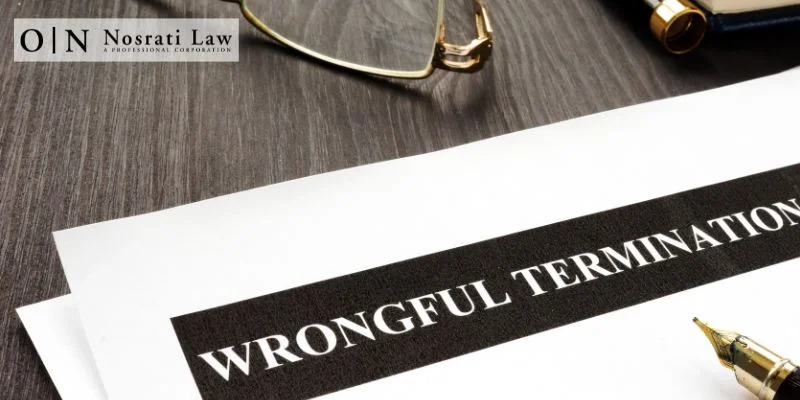
FREE CONSULT
ALL FIELDS REQUIRED*
NO RECOVERY NO FEE
Jobs are designed to provide an income that allows you to take care of yourself and your family. Because you rely on that compensation, losing the job can have detrimental impacts on your household. However, there are times when that job loss is unjustified by the employer. This can often leave you with more questions than answers.
Finding the answers could be as easy as contacting Nosratilaw, A Professional Law Corporation. With over 20 years of experience in employment law, our team has handled a vast number of wrongful termination cases. We look at the evidence to help guide you through the options you have available in Glendale, CA.

The California workforce is vital to the success of the state. Because of that, employees are highly valued and have an array of laws that help to protect their rights. While most of the laws are clear, some ambiguity exists that can be harmful to both employers and employees. As an “at-will” state, California allows employers and employees to separate from one another at any time and for any reason so long as there are no violations of other employment laws.
This creates the illusion that there is no such thing as wrongful termination. However, this occurs when the separation is due to a breach in the legal policies that protect workers. Specifically speaking, employees are protected through policies, regulations, and statutes that say they shall be free of discrimination, harassment, and retaliation.
California protects the individual characteristics of its citizens. These include a person’s age, gender identity, marital status, race, religion, sexual orientation, disability, and many others. If an employee, for example, is terminated for a reason relating to one of those protected characteristics, it would be considered wrongful termination. Other examples include:
These are just a few of the examples that could be considered wrongful termination, however. Many other instances could qualify as well. At the time of hiring, you are provided with information from your employer that includes the wage you will earn, the estimated hours you will work, and the duties you will perform. This information is the binder that protects you against wrongful termination. Your Glendale employment attorney can help investigate the evidence of your case to make a determination.
There are several laws in place that protect the rights of workers from wrongful termination at both the federal and state levels. Wrongful termination must violate at least one of the following employee protections:
Wrongful termination is a subtle violation because it can be masked in other areas of employment that employers can use. Many employers are familiar with the law and try to disguise the true motives for terminating an employee. However, the law accounts for these and defines wrongful termination in two ways to better uncover the infractions when they happen. The two types of wrongful termination include:
If you feel the termination of your employment was unjustified, there are critical steps you can take that will help you and your employment attorney determine your next steps. To prove wrongful termination, you need to be able to show that the rationale for your separation was unjust and illegal. Most wrongful terminations are rooted in retaliation, discrimination, breaches of contract, or violations of public policies. To prove this, follow these crucial steps:
A: Each wrongful termination case is different, so the settlements will be different. On average, claims award employees less than $70,000. However, this is strictly an estimate. Your settlement is going to be based on your salary, the time out of work you missed, and other damages you may be entitled to.
A: All California employers, whether private, public, or government-run entities, are subject to the laws that protect employees from wrongful termination. That means they can be sued for violating the protections granted to employees.
A: If you suspect you were wrongfully terminated, your first step should be to contact an employment attorney with evidence to illustrate the illegal nature of your separation. Your attorney will then review the information you have and help guide you through the civil process.
A: Wrongful termination must be filed within two years of the date of separation according to the statute of limitations. If you are going to file any additional claims for discrimination or harassment, it must also be done within one year of when the incident occurred. However, if you are part of a union and the termination was based on a breach of a Collective Bargaining Agreement, then you must file a claim within six months.
Employment is a necessity for everyone to properly support themselves and their families. When you perform the duties of your job to the best of your abilities, there shouldn’t be any worry over losing your job. However, when an employee experiences discrimination, harassment, or a violation of their rights and these circumstances lead to an illegal separation from their employer, it is time to get in touch with Nosratilaw, A Professional Law Corporation. Our experienced employment attorneys can help investigate your case, provide guidance, and help you file a claim for wrongful termination.